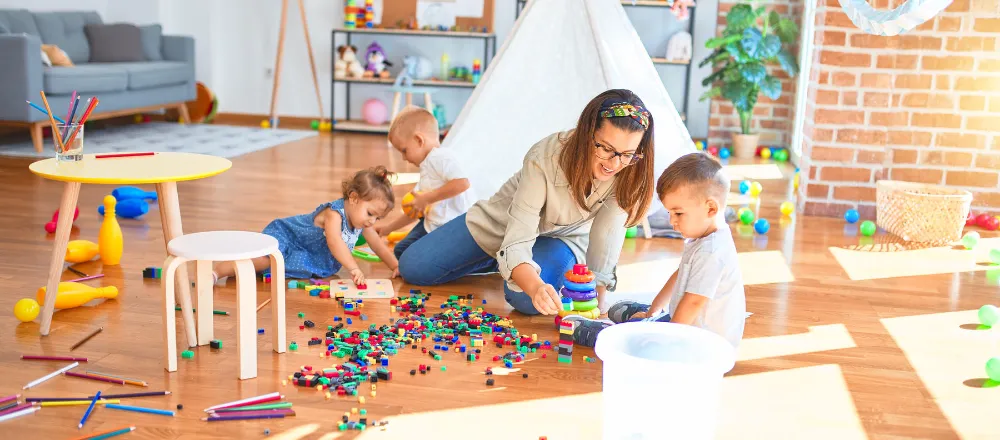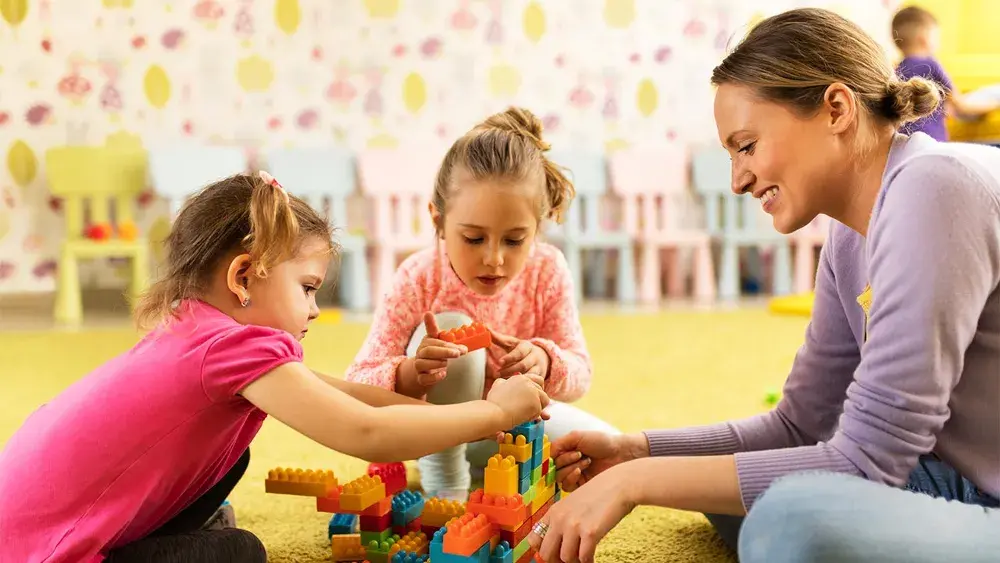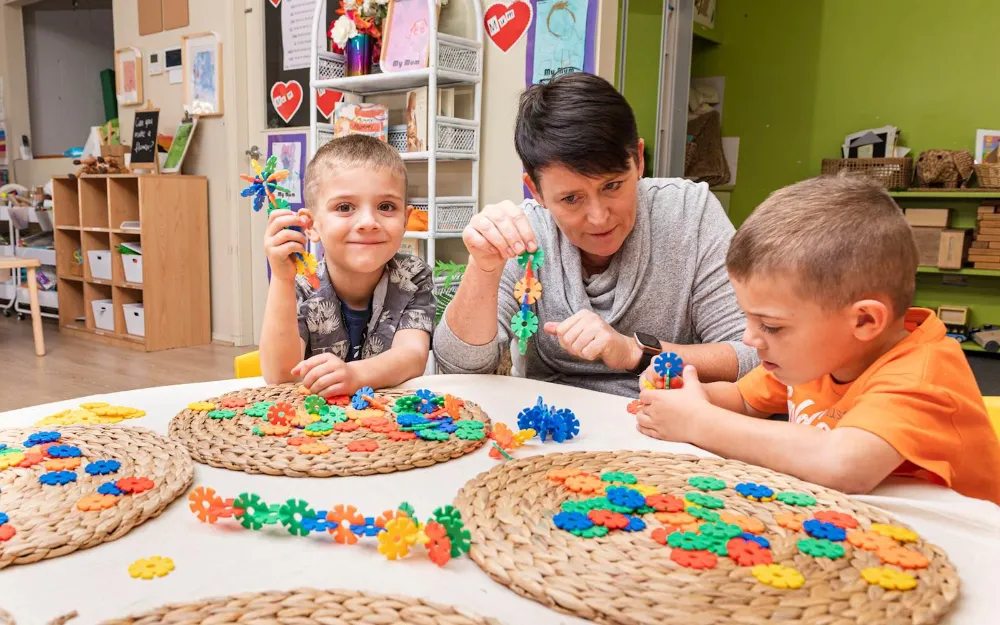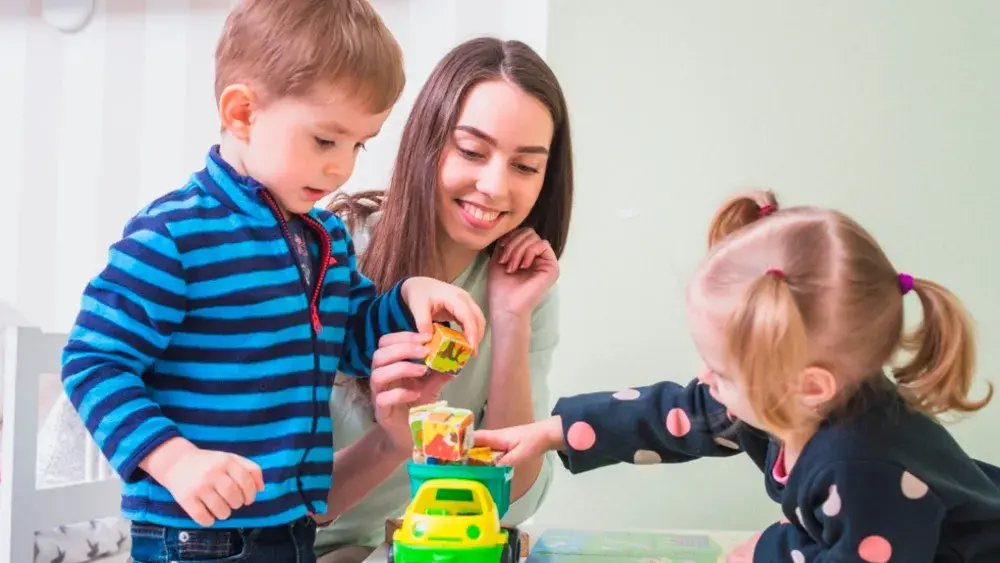Nursery Teacher Interview Questions

Source: growingroomberlin
Nursery Teacher Interview Questions
Are you an aspiring nursery teacher looking to land that dream job at a prestigious institution?
If so, you must be well-prepared for the interview process and the Nursery Teacher Interview Questions. At Vidhyanidhi Education Society, we understand the importance of a strong foundation in early childhood education and are committed to helping you achieve your professional goals.
In this blog post, we will provide a detailed step-by-step guide to help you tackle Nursery Teacher Interview Questions with confidence and ease.
By understanding the expectations of interviewers and crafting thoughtful, well-rounded responses, you can make a lasting impression and secure your place as a nurturing and skilled educator.
Table of Content

Source: momnewsdaily
Do Your Homework
Before stepping into the interview room, research the institution and its educational philosophy.
Familiarize yourself with the school’s mission, values, curriculum, and teaching methods. By doing so, you’ll demonstrate your genuine interest and dedication to the institution.
Reflect on Your Teaching Philosophy
As a nursery teacher, your teaching philosophy will be at the core of your work. Take time to reflect on your beliefs about early childhood education and how you plan to put them into practice.
Be prepared to discuss your approach to teaching, classroom management, and relationship-building with students, parents, and colleagues in the Nursery Teacher Interview Questions.
Prepare for Common Interview Questions
While each interview is unique, there are common Nursery Teacher Interview Questions that you can expect.
Practice your answers to these Nursery Teacher Interview Questions in advance:
Why do you want to be a nursery teacher?
I want to be a nursery teacher because I am passionate about early childhood education and understand the importance of creating a strong foundation for lifelong learning.
Working with young children allows me to make a positive impact on their lives during their formative years. I love nurturing their natural curiosity, fostering their social and emotional development, and helping them discover the joy of learning.
As a nursery teacher, I have the unique opportunity to shape young minds and contribute to their overall growth and development.
Can you describe your teaching philosophy, specifically as it relates to early childhood education?
My teaching philosophy for early childhood education revolves around creating a nurturing, engaging, and inclusive learning environment that caters to the diverse needs of young learners.
I believe that children learn best when they are actively involved in the learning process, and I strive to create hands-on, play-based experiences that spark curiosity and promote exploration.
I focus on fostering a strong sense of community within the classroom, emphasizing respect, empathy, and collaboration. Additionally, I value strong partnerships with parents, recognizing their vital role in supporting their child’s education and development.
How do you create an inclusive and diverse learning environment in your classroom?
To create an inclusive and diverse learning environment, I start by getting to know each student as an individual and understanding their unique backgrounds, strengths, and needs.
I then design my curriculum and lesson plans to accommodate these diverse learning styles, abilities, and interests. I incorporate multicultural materials, stories, and activities to expose children to different perspectives and promote respect for diversity.
I also emphasize social and emotional learning, teaching students essential skills such as empathy, communication, and conflict resolution, which are crucial for building a supportive and inclusive classroom community.
To promote social and emotional development in young children, I use a combination of the following strategies:
- Modelling appropriate behaviour and emotions, such as expressing gratitude, sharing, and resolving conflicts peacefully.
- Encouraging open communication and providing opportunities for children to express their feelings and emotions.
- Implementing activities that promote self-regulation, empathy, and problem-solving skills.
- Creating opportunities for group work and cooperative play to teach children how to interact with others and work together.
- Providing a safe and supportive environment where children feel comfortable expressing their emotions and know that their feelings are valued and respected.
How do you encourage creativity and curiosity in your students??
To encourage creativity and curiosity in my students, I:
- Design open-ended, hands-on activities that allow children to explore, experiment, and engage with materials at their own pace.
- Offer a variety of materials and resources that inspire creativity, such as art supplies, building blocks, and natural materials.
- Encourage children to ask questions and seek answers through exploration and inquiry.
- Provide opportunities for imaginative play and role-playing to help children develop their creativity and storytelling skills.
- Celebrate each child’s unique ideas and creations, promoting a growth mindset and fostering a love for learning.
Call or Whatsapp at +919869546913 / +9198698 66277 for more details.
For Downloading the brochure click here

Source: raisingchildren
What methods do you use to assess the progress of your students?
To assess the progress of my students, I use a combination of formative and summative assessments, including:
- Observations and anecdotal records of children’s interactions, behaviours, and learning experiences.
- Checklists and rating scales to track the development of specific skills and abilities.
- Portfolios that showcase students’ work and demonstrate their growth over time.
- Parent-teacher conferences to discuss student’s progress, strengths, and areas for improvement.
- Collaborative assessments with colleagues, where we discuss students’ development and plan for individualized support.
How do you handle challenging behaviour in the classroom? Can you provide an example?
When handling challenging behaviour in the classroom, I follow a proactive and positive approach. First, I establish clear expectations and routines to create a consistent and predictable learning environment. I use positive reinforcement to encourage desired behaviours and redirect children when necessary.
When dealing with challenging behaviour, I address the root cause of the behaviour, work with the child to develop appropriate strategies and collaborate with parents and colleagues to provide consistent support.
For example, I had a student who frequently disrupted the class by calling out and interrupting others. I observed the child closely and noticed that the behaviour often occurred when he was not engaged in the activity. I started by providing him with more challenging tasks and opportunities for leadership roles in the classroom, which helped to keep him engaged and reduced disruptive behaviour.
I also worked with him on developing self-regulation skills and practiced using a quiet signal to ask for help or attention. Additionally, I communicated with his parents and shared strategies to support his behaviour management at home.
Can you describe your experience working with children who have special needs or learning disabilities??
Throughout my career as a nursery teacher, I have had the opportunity to work with children with a variety of special needs and learning disabilities, including autism spectrum disorder, ADHD, and speech and language delays. I believe that all children can learn and thrive when provided with the appropriate support and accommodations.
When working with children with special needs, I collaborate closely with their families, special education professionals, and other support staff to develop and implement individualized education plans (IEPs).
I differentiate my instruction to meet each child’s unique needs, incorporating a variety of teaching strategies, such as visual aids, hands-on activities, and modified materials. I also focus on creating an inclusive classroom environment where all students feel valued and respected, fostering a sense of belonging and encouraging positive peer interactions.
How do you engage parents in their child’s learning and involve them in the educational process?
I believe that parents are integral partners in their child’s education, and I strive to foster strong relationships with families.
To engage parents, I:
- Maintain open lines of communication through regular updates, newsletters, and parent-teacher conferences.
- Invite parents to share their expertise and cultural background through classroom presentations, activities, and events.
- Offer workshops and resources to help parents support their child’s learning and development at home.
- Encourage parent involvement in school events, field trips, and volunteer opportunities.
- Seek feedback from parents on their child’s progress and work collaboratively to address any concerns or challenges.
How do you handle conflicts or issues that may arise between parents and the school??
When addressing conflicts or issues between parents and the school, I follow a respectful and collaborative approach. I first listen to the parent’s concerns and acknowledge their feelings.
Then, I provide information and context to help clarify the situation and explore possible solutions. I involve relevant colleagues and administrators, if necessary, to ensure that we address the issue comprehensively and in the best interest of the child.
Throughout the process, I maintain open communication, focusing on building trust and working together to support the child’s growth and development.
How do you stay current with the latest developments and research in early childhood education??
To stay current with the latest developments and research in early childhood education, I:
- Attend professional development workshops, conferences, and webinars to learn about new strategies, techniques, and best practices.
- Participate in professional learning communities and network with other educators to share ideas and resources.
- Subscribe to early childhood education journals and follow relevant blogs and social media accounts to stay informed about new research and trends.
- Reflect on my teaching practice and seek feedback from colleagues and mentors to continuously improve and grow as an educator.

Source: careforkids
How do you adapt your teaching methods to accommodate different learning styles and needs?
To adapt my teaching methods to accommodate different learning styles and needs, I:
- Use a variety of teaching strategies, such as direct instruction, inquiry-based learning, and cooperative learning, to engage all learners.
- Incorporate diverse materials and resources, including visual aids, manipulatives, and technology, to support different learning modalities.
- Differentiate instruction by providing choices in assignments, varying the complexity of tasks, and offering additional support or extensions as needed.
- Assess students’ progress regularly to identify their strengths, areas for growth, and preferred learning styles, using this information to inform my instructional planning.
- Foster a growth mindset in the classroom, encouraging students to embrace challenges, persist through setbacks, and believe in their ability to learn and grow.
What role does play have in your curriculum, and how do you incorporate it into your daily schedule?
Play is a fundamental component of my curriculum, as it fosters creativity, curiosity, and social-emotional development in young children.
I incorporate play into my daily schedule by:
- Providing ample time for free play, where children can explore materials, engage in imaginative play, and interact with their peers.
- Incorporating structured play activities that align with learning objectives, such as dramatic play scenarios, games, and creative art projects.
- Offering a variety of play-based learning centres that cater to children’s interests and promote the development of essential skills, such as literacy, numeracy, and fine motor skills.
- Encouraging outdoor play, allowing children to connect with nature, develop gross motor skills, and engage in physical activity.
- Intentionally planning play-based learning experiences that promote collaboration, problem-solving, and critical thinking.
Can you provide an example of a successful lesson plan or activity that you’ve implemented in your classroom??
One successful lesson plan I implemented involved teaching children about the life cycle of a butterfly. I began by reading a story about a caterpillar transforming into a butterfly, followed by a group discussion about the stages of the life cycle.
Next, I provided materials for children to create their own butterfly life cycle models, using pasta shapes to represent each stage. As a follow-up activity, I incorporated dramatic play by having the children act out the life cycle, which allowed them to deepen their understanding through movement and role-playing.
This lesson was successful because it engaged various learning modalities, fostered creativity, and encouraged active participation from all students.

Source: whatparentsask
Showcase Your Skills and Accomplishments
Don’t be shy about sharing your achievements, certifications, and any specialized training you’ve received while answering the Nursery Teacher Interview Questions.
Provide specific examples of your successes in the classroom, such as improved student outcomes or innovative lesson plans you’ve developed.
Ask Thoughtful Questions
An interview is a two-way street. Prepare thoughtful Nursery Teacher Interview Questions about the school’s culture, curriculum, and expectations for teachers.
By asking insightful Nursery Teacher Interview Questions, you demonstrate your genuine interest in the institution and your commitment to continued growth as a professional.
Practice Makes Perfect Rehearse your answers
Rehearse your answers to potential Nursery Teacher Interview Questions, ideally with a friend or family member who can provide feedback. This practice of answering Nursery Teacher Interview Questions will help you feel more confident and articulate during the interview.
By following this systematic step-by-step guide, you’ll be well-prepared to tackle Nursery Teacher Interview Questions and make a lasting impression on your interviewers.
Remember, your passion for early childhood education and your commitment to nurturing young minds will shine through as long as you are authentic and well-prepared. Good luck on your journey to becoming a successful nursery teacher!
At Vidhyanidhi Education Society, we understand the importance of providing comprehensive teacher training that covers all aspects of preschool teaching. Our Teacher Training Course is designed to equip aspiring educators with the knowledge, skills, and confidence they need to excel in the classroom.
With a strong focus on curriculum development, classroom management, children’s behaviour management, and more, our program ensures that you are well-prepared to tackle the challenges and rewards of early childhood education.
Join Vidhyanidhi Education Society’s Teacher Training Course today and take the first step toward a fulfilling and successful career in early childhood education.
For admissions and queries please connect with us at 9869546913 / 9869866277
For Downloading the brochure click here
FAQs
What is NTT exam?
NTT exam refers to the examination that trainees undergo on completion of which they are eligible to work as accomplished teaching professionals in reputed Preschools at attractive pay packages.
What are the roles and responsibilities of a nursery teacher?
The roles of a nursery teacher include creating a nurturing environment &fostering overall progress of the child. Vidhyanidhi Education Society trains aspirants making them skilled teachers.
How to get affiliation for nursery teacher training?
To get affiliation for nursery teacher training, contact the appropriate educational regulatory authority or accreditation bodies for the specific requirements and procedures.
What is the salary of primary teacher?
The salary of a primary teacher varies based on experience, qualifications, and location. On average, it ranges from Rs.25,000 to Rs.50,000 per month in India




